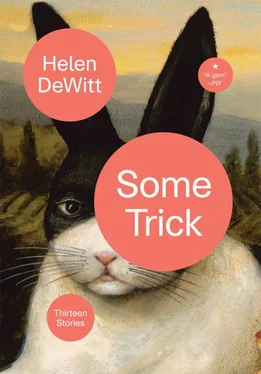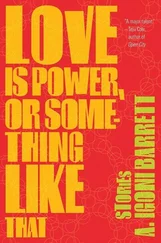I do understand, Peter said wearily, that we can’t reasonably expect to find an editor of children’s books with mathematical, scientific, or even philosophical training. But Russell, after all, was a great populariser; it’s surely not beyond the realm of probability that a general reader should be familiar with his popular work, work written for a general audience. The thing that matters is not, ultimately, an understanding of number theory, or the structure of the atom, or the semantic tradition, but an unswerving commitment to the pursuit of truth. I should be happy to forgo 70% of the revenue from a book to avoid entrusting it to a person to whom this is perfectly indifferent; one has to be particularly scrupulous in these matters when writing for children. That is the overriding interest which I hope to persuade you to represent. As ours is a business relationship, a financial incentive cannot, it seems to me, be offensive as it would be among mathematicians, scientists or philosophers. It is entirely reasonable for me to determine my own ends and offer financial compensation to you for the inconvenience of promoting them.
Jim made a number of friendly American remarks. It was by no means clear that the offer of a financial inducement within the context of a business relationship had not been perceived as offensive. It was, unfortunately, painfully obvious that he had not warmed to the style of social interaction which is a robot’s principal source of appeal. The business of adapting a robot to American manners is, of course, an engineering feat of considerable ambition.
Peter said, Will you excuse me a minute?
He stood up and left the diner.
In Oxford he was able to smoke at the Union, to which his father had given him a life membership in his freshman year.
He drifted to the lee of a wall. He took out a packet of Dunhills and lit one.
As a child he had had five imaginary robots as friends.
The robots had stopped talking to him somewhere during the protracted battles over e iπ . It was a happy accident that a second book had been finished before they stopped talking.
It seemed unlikely that intervention from Jim would bring the robots back.
Perhaps Jim was an orphan.
Peter stubbed out his Dunhill on the sole of his shoe. He slipped it into a pocket. He pressed the palms of his hands to his eyes.
At his shoulder he heard a voice he had not heard for some time.
The robot pointed out pleasantly, dispassionately, that it would, certainly, be political suicide for a legislator to attempt to introduce an aleatory element into the allocation of minors, but that this was far from exhausting possible solutions. Research had already demonstrated that autistic children responded well to robot companions. It was only a matter of time before a robot companion was seen as an effective developmental adjunct for every child. From this it was a short step to recognition of the fact that each child would best be served by a complement of robotic aides. Robots could be exchanged, upgraded, used in different combinations with none of the social constraints affecting human subjects.
That’s true, said Peter.
He propped his right shoulder against the wall, right leg loosely bent, left leg perhaps 20 degrees from the perpendicular, left hand shoved in a pocket.
The robot observed that, as all children would be guaranteed a minimum of one rational companion, exposure to the variable rationality of the human beings in whose charge a child found itself would be significantly limited in the damage it could do.
Peter did not say anything, for he was listening attentively. His gaze had fallen to the ground as the least troublesome place for it.
The robot continued to speak. It was restful in the way that robots are restful.
When a human being develops an argument, when a human being attempts not only to think but to speak with precision, he or she is often made to feel that this is a mark of social inadequacy and that there is something comical about it. The younger the human being, the more humorous it becomes. So that humans whose inclination it is to think and speak in this way become self-conscious from an early age, and a kind of minstrelisation creeps in.
It was once the case that so-called minstrel shows were put on for the amusement of white audiences, and for these blacks would black up , put on black-face (!!!!!!!), exaggerating what whites perceived as comically grotesque features of negroid appearance, exchanging dialogue exaggerating what whites perceived as the ignorance and stupidity of the inferior race. In a similar way the rationalist is socialised to mug for the camera, trotting out recondite facts, objecting to logical fallacies, using polysyllabic words in sentences with a high number of dependent clauses, with the quizzical air of one who knows he is amusing the interlocutor by conforming to a fondly held stereotype.
A robot lacks this self-consciousness; one becomes aware of one’s own seeing the robot’s lack. A robot is, in any case, a machine: if it were conscious it would know that machines are not socially stigmatised for sounding like machines. A man who is accustomed to social stigma tends, curiously enough, to be repelled by persons like himself who are tarred with the same social stigma; it is a comfort to talk to a robot, in which rationality carries no stigma.
Peter lit another Dunhill while the robot talked persuasively on.
Ah! the revivifying properties of tobacco! Peter remembered suddenly that in his hour of need, viz. 3 am Greenwich Mean Time, he had fired off an e-mail to Andrew Gelman, Director of Applied Statistics at Columbia University, entreating assistance. If he had not been relatively new to R he would undoubtedly have known what to do; if he had not been catching the AirBus at 5 am he could undoubtedly have worked it out; these are not the circumstances in which one goes to the R Help Forum and exposes one’s ignorance to Brian Ripley, Duncan Murdoch, Gabor Grothendieck, Uwe Ligges, Peter Dalgaard, Deepayan Sarkar and other R supremos. Professor Gelman, on the other hand, had a son who had liked the first robot book; at 3 am the circumstance had seemed to extenuate.
At this very moment a reply to his e-mail might be waiting! He had spotted a Staples and a Kinko’s on 6th Avenue; either, surely, would permit him to see if anything useful had come in. Or for that matter — His laptop was in his hotel room. And his hotel (chosen for proximity to a bar at which one was permitted to smoke) was just off 8th Avenue, which was, he rather thought, just around the corner. (No longer a penniless academic, he had been easily able to afford the rates of the Gansevoort.)
Peter strode purposefully off — nothing like talking to a robot for clearing the head!
Restored, presently, to the comforts of the Gansevoort, he opened his trusty laptop, and what to his wondering eyes should appear but an e-mail from Andrew Gelman, his friend .
Dear Peter,
I’m not exactly sure what you’re looking for, but here’s my quick try:
n <- c (10, 20, 50, 90, 100)
n.graphs <- length (n)
par (mfrow=c(n.graphs,1), mar=c(2,2,0,1), mgp=c(1.5,.5,0), tck=-.01)
total <- 70
for (i in 1:n.graphs){
barplot (dbinom(0:total,n[i],.5), width=1, space=0, xlim=c(0,total+1), ylim=c(0,.3), xaxs=“i”, yaxs=“i”, yaxt=“n”)
ticks <- seq (0, 200, 10)
axis (1, ticks+.5, ticks)
axis (2, c(0,.1,.2))
text (total-5, .2, paste ("(n = ", n[i], ")", sep=""), cex=1.2)
}
Peter launched R. He typed in the suggested code, and lo! a plot appeared, a beautiful little array of histograms with the x axis labelled !
Читать дальше












